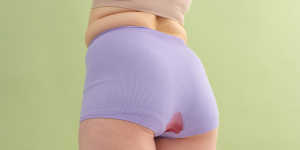Illustration by Marta Pucci
The stand-up comedy group tackling taboos in Pakistan
Auratnaak started with an idea: make a space for women on the comedy stage.

When I first moved from the United States to Pakistan and began my new job, I got the menstruation sensation. There was only one person within driving distance of my office who could help: my father.
Like many Pakistanis, I grew up having to be hush-hush about my red rush for many years. But unlike a lot of Pakistanis, I had claimed some agency over talking about it out loud. My father was quick to grab a bag of pads and deliver them to me at work. All in all, not a very groundbreaking tale.
But to say dupattas (the long scarves worn by Pakistani women) were clutched would be an understatement. My mother told a few female-identifying family members the story, and they were horrified that my father had been in a conversation about my period—let alone forced to handle a pack of pads!
In Pakistan, the conversation about periods is one that rarely happens. It’s seen as something shameful, saved for whispers behind closed doors between women (if at all). The period is as iffy to talk about as sex.
But there is a new space for breaking menstruation taboos here: comedy. The Auratnaak comedy troupe, an all female-identifying group in Pakistan’s seaside Karachi, was founded by comedian Hassaan Bin Shaheen. He and his cofounders, Faiza Saleem and Sadia Katri, have created a movement that has crossed into Lahore and Islamabad.
“You’re in school, and all of a sudden you start bleeding from an unmentionable place”
A young girl in Pakistan has probably had more conversations about her future as a wedded woman (excluding the sex) than any conversation about her period.
Zara Zaman Khan is in the Islamabad chapter of the Auratnaak comedy group. Her first comedy set was a long telling of the mishaps that happen when information about periods has not been shared—girls believing they have cancer, or screaming because they think they are dying.
“In a society that constantly talks about getting married and having children, the very source—the bodily function that leads to having children, in the traditional sense—is completely denied and omitted from the narrative,” Khan says.
Mina Malik-Hussain, from Lahore’s Auratnaak group, shared this sentiment. “When I was growing up, a lot of girls did not know what was going on. You’re in school and all of a sudden you start bleeding from an unmentionable place. It’s terrifying!”
As a comedian myself, I have used the stage to talk about body shaming, dating, and yes, often, my period. Because I got my period so young, at the age of 9, I have lived with my period for a bit longer than most people I know. It’s a constant source of inspiration for me.
When I got my period, I sincerely believed I was going to die. I told my parents nothing; I did not want to upset them. Drawing a conclusion about the commercials I had seen on television (not once has a commercial on periods uttered the word “blood”) , I decided to throw on a pad from my mother’s pack in the bathroom. Days later, my mom questioned me (meanwhile, I was counting down the hours of my life, as I was sure I was near finished bleeding out). I admitted that I was trying to hold on for as long as I could.
Now that I was in the know, I was told two things: do not tell your sister and do not tell your dad.
“It’s a conversation that should be normalized and desensitized—it’s not shocking”
Auratnaak was created in direct response to an existing comedy scene that wasn’t missing women, per se—but it made them the butt of the jokes. Men made jokes about women that objectified them, or stereotyped them as shrews, or made light of topics like rape.
The founders of Auratnaak wanted more women to join the space of stand up comedy, and introduce diverse female perspectives—whether it be about (shudder!) periods, the patriarchy, family, dating, sex, or marriage.
“I was ashamed and uncomfortable talking about periods when I was younger,” says Yusra Amjad, of Auratnaak’s chapter in Lahore. “What I cover about periods is their absurdity and just what a strange experience it is. Though I don't cover it in a negative light, and I have a positive view of menstruating.”
When Lahore’s Auratnaak group performed in the capital of Islamabad, they were met with criticism from an audience member who was not happy with period talk happening in front of men.
“It’s a conversation that should be normalized and desensitized, it’s not shocking,” says Islamabad Auratnaak’s Zara Zaman Khan. “Even today if I mention my period, or this conversation, my mother will be quick with the ‘Na paak baat!’ (unclean talk).”
The laugh that Auratnaak members get from period jokes is built into the subject matter—that “matter” being the cringe that results from mentioning one’s period. Particularly here in Pakistan, where buying pads is a mission that requires the help of a lady in waiting: a woman who is usually in the paid aisles of stores, who will hand you a brown paper bag to cover up your sexy purchase—lest the men see!
There is solidarity found in discussing our common ground, and the joyful, sometimes-flinch inducing ridiculousness of our shared experiences. Auratnaak is creating a space for it in Pakistan—and it’s growing quickly.
